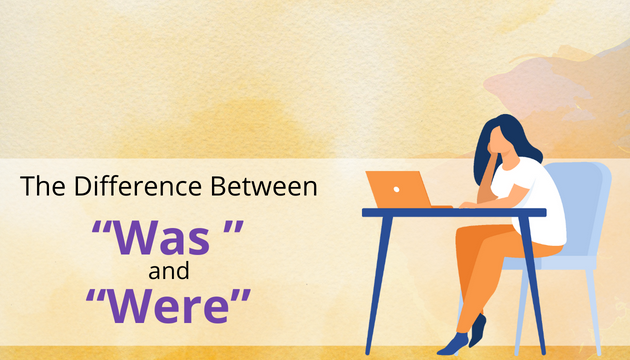If you were a billionaire, what would you do? In addition to being a fun situation to think about, this question brings up some grammatical confusion. Is the correct response “If I was a billionaire” or “If I were a billionaire“, and why?
English is a famously difficult language to learn, and one of the trickier aspects of English is how to use the verb “to be” correctly.
Whether discussing the past, present, or future, proper conjugation of “to be” changes depending on the subject. But verb tenses and subject-verb agreement aren’t the only factors that impact how we should conjugate “to be” and other verbs.
Grammatical moods also influence proper conjugation, confusing both native and non-native speakers alike about the difference between was and were and which is correct. So what are grammatical moods, and how can you make sure to correctly use “was” vs. “were”? Let’s look at the difference between was and were below.
Table of Content:
Was vs. Were
Was and were are both past tense forms of the verb “to be.” Whether you should use was or were depends on a couple of things. These are:
- Whether you are speaking in first (I), second (you), or third (he/she/it) person
- Whether your subject is singular or plural
- Which grammatical mood you are using (indicative, subjunctive, or imperative)
We’ll talk a little more about grammatical moods below, but first, let’s review the basic conjugation of the verb “to be” in the past tense.
- I was
- You were
- He/she/it was
- We were
- You were
- They were
You’ve probably learned these as the rule. But actually, there are some exceptions where “I were” is correct. These exceptions relate to what is called grammatical mood.
What are Grammatical Moods?
The phrase grammatical moods itself can be a little confusing. We usually think of moods as feelings. But grammatical moods don’t express a type of feeling.
Actually, grammatical moods just tell us what type of statement a sentence is making. We use the subjunctive mood to express wishes, imaginary situations, hypotheticals, or possibilities.
Contrast this with the indicative mood, in which we simply make statements, and the imperative mood, where we give commands.
| Indicative | Subjunctive | Imperative |
| Statements | Wishes, imaginary situations, hypotheticals, possibility | Commands |
What does this actually look like? Let’s imagine a criminal interrogation. A bag of gold has been stolen, and the detective investigating the case has arrested a suspect. The detective will use the indicative mood to ask, “where were you when the bags full of gold were stolen?”.
If our suspect denies committing the crime, they could respond in the indicative, offering an alibi like “I was with my parents watching a movie at the discount theatre” or “I was at home washing my hair.”
But our suspect could also use the subjunctive mood to provide additional reasons as potential proof of innocence. Our suspect might say, “but officer, if I were the thief, I would have fancier clothes,” or “if I were the criminal, I wouldn’t live in such a small house in a bad part of town.”
They might say, “if you weren’t interrogating me as if I were a criminal, you could have caught the thief by now.”
If the detective doesn’t believe the suspect, well, the suspect is likely to become desperate and start using the imperative mood. “Let me go now!” he demands. “Give me the phone so I can call my lawyer!”
Conjugating Was vs. Were in Different Grammatical Moods
In the indicative mood, the verb “to be” is simple to conjugate. As we saw in our examples above, in the indicative mood, the detective asks, “what were you doing,” and the suspect replies “I was at home washing my hair.”
However, when we speak in the subjunctive mood, we should always use “were” in the past, no matter our subject. “I were” and “it were” sounds a bit odd at first glance, but when you consider the subjunctive mood includes a conditional “if,” “though,” or “as if” it sounds more natural. Let’s look at a few examples:
- If she were my wife, I would never look at another woman. (She is not my wife)
- He spoke to me as if I were a child. (I am not a child)
- My sister spends money as though she were rich, so she is in a lot of debt. (My sister is not rich)
- If you were 230 cm tall, you could be a famous basketball player. (You are shorter than 230 cm)
An easy way to remember whether you should use was vs. were is to consider whether the situation is real or not real. In the examples above, note that she is not my wife, I am not a child, my sister is not rich, and you are not 230 cm tall. When the situation being discussed is not true, we use the subjunctive mood and the verb form “were.”
| Indicative | Subjunctive | Imperative |
| Statements | Wishes, imaginary situations, hypotheticals, possibility | Commands |
| I was
You were He, she, it was We were You were They were |
I were
You were He, she, it, were We were You were They were |
Be |
Using Was vs. Were Correctly Every Time
Now that you know the difference between was vs. were, and have learned about the subjunctive mood, you don’t need to think to yourself “if I were better at English, I would never be confused about the difference between was vs. were.”
You’re sure to apply the correct past form of “to be” when you’re speaking in the subjunctive. If you’re still confused though, you can always use the help of an AI writing tool like Trinka, which checks your grammar, spelling, style, and more to ensure no confusion between “was” and “were.”

